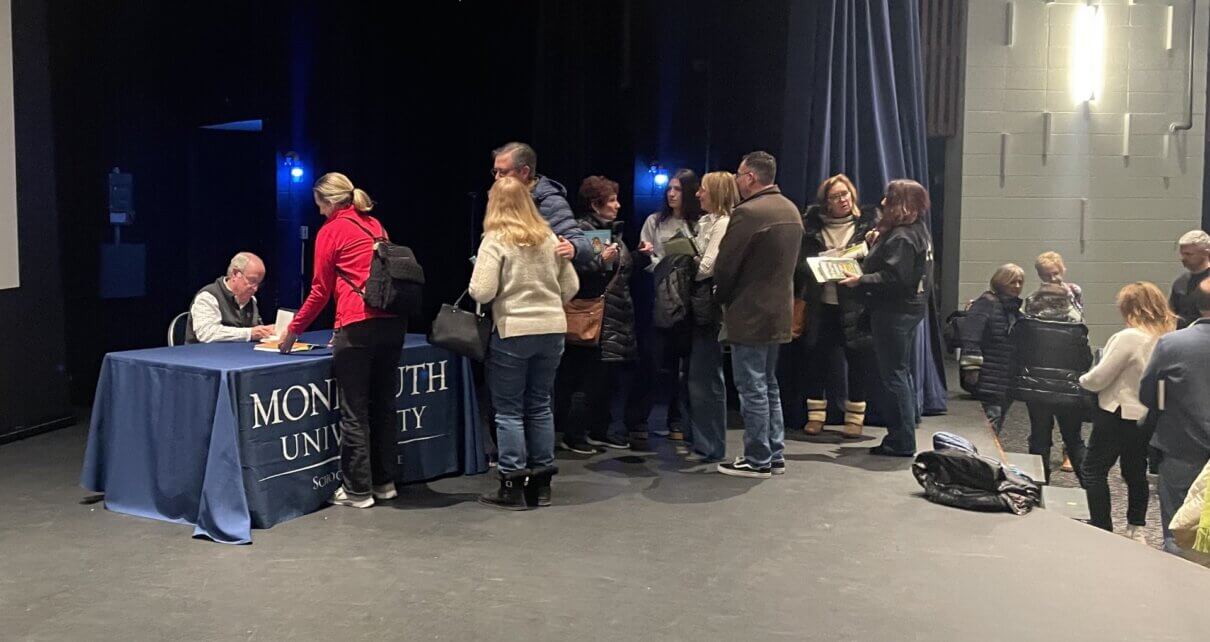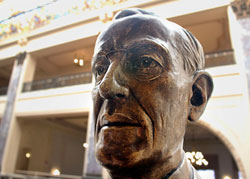Doug Tallamy, Ph.D., Professor of Entomology at the University of Delaware, presented “Fighting Climate Change at Home: Homegrown National Park” at the Climate Teach-In on Tuesday, Jan. 23 in Pollak Theater. Co-sponsored by the Leon Hess Business School and the School of Social Work, the presentation filled up almost every seat in the theater.
“Over 540 people registered for the event, and in the end, the attendance was about 425,” said Catherine Duckett, Ph.D., Associate Dean of the School of Science, organizer of the Climate Crisis Teach-Ins, and entomologist. “I am proud of the fact that Doug is popular enough that the community garden, the Native Plant Society of New Jersey, and the Monmouth Conservation Foundation all pleaded with me to have a table at the event. One attendee even called the New Jersey Department of Environmental Protection (NJDEP) to ask if the event could be eligible for NJDEP Urban and Community Forestry Continuing Education Units. The DEP contacted me, and in the end, 50 people received continuing education credits for attending.”
Tallamy is an entomologist who has authored 106 research publications, taught insect-related courses for 41 years, and been published in the “Smithsonian Magazine.” He is the founder of Homegrown National Park, a grassroots call-to-action for restoring biodiversity through planting native where they live.
Duckett’s inspiration for holding this event came from wanting people to talk about what they could do to address the climate crisis. She said, “Right now the real climate denialism is that all is lost. It’s not; there are many things regular citizens can do to make things less bad. Moreover, plants and gardening unite people from all parts of the political spectrum, and we need the left and the right to stand down from the barricades and discuss climate solutions rationally.”
Solutions were exactly what Tallamy discussed in his lecture.
He advised visiting homegrownnationalpark.org, a site that can inform what plants are native to certain areas. Invasive plants reduce biodiversity by outcompeting and displacing native species, whereas biodiversity allows for more resilient ecosystems that can counter environmental changes.
He emphasized, “Life as we know it, depends on insects.” Ninety percent of insects are specialized to a plant, marking the importance of native plants. Simple changes can help protect these insect populations from being killed by more than just their natural predators.
Tallamy also suggested the implementation of “bug lights,” which are yellow LED or incandescent lights, since they reduce light pollution that kills these vital insects.
Mosquito fogging kills all insects while only controlling ten to twenty percent of mosquitoes. Instead, Tallamy proposed making homemade mosquito dunk which would kill mosquito larvae without harming other vital insect populations.
Finally, when gardening, avoid pink or purple coated seeds that are indicative of neonicotinoids. These are 7,000 times more toxic to insects than DBT and already banned in Europe.
Corey Dzenko, Ph.D., Associate Professor of Art and Design who has taken classes about native plants and gardening through Monmouth County Parks, said, “I’ve learned a lot and am trying to change my family’s yard to include more native plants to support a more diverse ecosystem rather than having a yard full of non-native turf grass that relies on the many chemical treatments that the former owner of our house used.”
Madison Patterson, a junior biology student, said, “I care about the environment, and I’m aware of the effects of climate change, but I wasn’t sure what I could do individually to help restore ecosystems…[The teach in] made me feel more confident about how I can contribute to an effort I believe is extremely important.”
Pedram Daneshgar, Ph.D., Professor of Biology and a plant ecologist who specializes in climate change impacts and has researched invasive species, explained, “I have visited [Dr. Tallamy’s] website and I am already thinking about the little things I can do on my property to help. In fact, as the faculty member in charge of the greenhouse, I have been thinking about how we could use the facility to help the community make their yards and gardens more like a national park.”
Duckett also received multiple reactions following the presentation. “One person told me what native trees she was going to plant this spring,” she said. “I got an email from a community member saying she was going to go out and buy a yellow light so that her porch is not a death trap for bugs. I talked to a professor about what he and his students could do to facilitate our students having access to native plants.”
Joseph Coyle, Ph.D., the Interim Dean of the School of Science commended the event’s ability to bring the community together, “The event was a great way for the University to foster connections with the surrounding community to address important issues at hand.”
Homegrown National Park urges individuals to add one keystone native plant to their garden or balcony this year as a way to promote small changes in the environment. Tallamy concluded his lecture, saying, “You don’t have to save biodiversity for a living, but you can do it where you live.”



